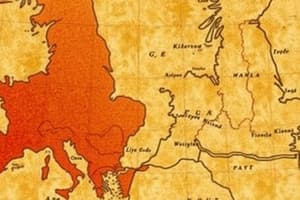Podcast
Questions and Answers
What characterizes a society that transitions to a state according to the content?
What characterizes a society that transitions to a state according to the content?
- It is defined by its reliance on external influences for state formation.
- It is predominantly agricultural and lacks political organization.
- It is non-stratified in terms of economy and social structure.
- It possesses a differentiated economy and stratified social hierarchy. (correct)
Which of the following statements about the origin of the state is accurate?
Which of the following statements about the origin of the state is accurate?
- The concept of secondary state formation is widely accepted in historical studies.
- The state originates from both internal and external factors.
- The state is a sui generis entity that develops independently within a society. (correct)
- The state formation is invariably a result of diffusion from surrounding societies.
What does the historical emergence of the state correlate with according to the content?
What does the historical emergence of the state correlate with according to the content?
- The development of democratic institutions within society.
- The influence of external colonial powers on local governance.
- The establishment of trade routes that connect various regions.
- The evolution from chiefdoms to kingdoms as political structures. (correct)
How is the state described in the context of early India?
How is the state described in the context of early India?
Which concept is highlighted as a misnomer regarding state formation?
Which concept is highlighted as a misnomer regarding state formation?
Flashcards
State in early India
State in early India
A complex and gradual process of development, not uniformly across regions.
State as an institution
State as an institution
A differentiated economy or stratified society is needed for a state to emerge.
Pre-state societies
Pre-state societies
Societies without a state, often not stratified.
State's origin
State's origin
Signup and view all the flashcards
State & Dynastic rule
State & Dynastic rule
Signup and view all the flashcards
Study Notes
Introduction to State Formation
- Understanding state formation in early India has evolved over decades through scholarly investigation.
- The emergence of a state is a complicated process.
- Theoretically, states are not universal in all historical societies; they are specific to stratified societies with differentiated economies.
- Pre-state societies are non-stratified.
- State origins are not external but emerge internally.
- States are unique entities.
- State emergence is not a result of diffusion or external transplantation.
- The concept of "secondary state formation" is inaccurate.
- The key questions are about the nature of societal formations that predate the emergence of a state.
- Historically, states (kingdoms/empires) emerged from chiefdoms in class-structured societies.
- Studying state formation is also about studying the transformations of chiefdoms into kingdoms.
Studying That Suits You
Use AI to generate personalized quizzes and flashcards to suit your learning preferences.



